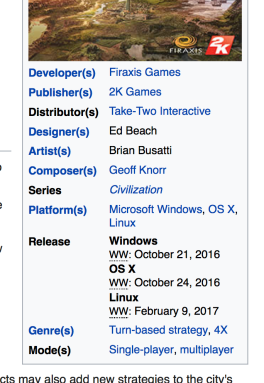“Once the Author is gone, the claim to “decipher” a text becomes quite useless. To give an Author to a text is to impose upon that text a stop clause, to furnish it with a final signification, to close the writing. This conception perfectly suits criticism, which can then take as its major task the discovery of the Author (or his hypostases: society, history, the psyche, freedom) beneath the work: once the Author is discovered, the text is “explained:’ the critic has conquered; hence it is scarcely surprising not only that, historically, the reign of the Author should also have been that of the Critic, but that criticism (even “new criticism”) should be overthrown along with the Author“
Roland Barthes- Death of the Author
Stop. Now read the quote again. Barthes is making a point fitting to a T for this blog. He makes the argument that with writing, the Author dies when he then spins his web of words to be read. The Author and the Critic die as the reader/player is
born.To find the authorship of any work, if not already specifically named, is superfluous, because the interpretation is now simply speculation. I thought this was pertinent to bring to this discovery in order to establish the boundaries of this inquiry. As I have now  established that this argument a fruitless endeavor, I may now proceed .
established that this argument a fruitless endeavor, I may now proceed .
Well, lets start with how much of a noob I am. I ordered Civilization VI for the PC on Amazon a couple weeks before we began this choice game. It was only after trying to insert the game into my 2012 Macintosh laptop that I came to a Simpson Homer “dope” moment. If you are ignorant to the fact that PC games do not work on the Mac like myself, then now ya know. Oh, and did I mention that the software update on my Mac needed to play Civ VI crashed my hard drive. So I eventually went to the App Store on the my new stupidly expensive Mac (not happy Apple) and purchased the correct version of Civilization VI and returned the useless PC game, well useless for me. For those who have yet to play this game, please do. Basically you start in a mysterious spot on a map with a random arrangement of continents and resources such as horses, iron, marble, fish, etc.. You then compete online or against a bunch of AI controlled Political leaders to grow and fight for resources, land, and advancement of your culture. Awesome.

As you can see from the list on the left in photo 1a, it is quite obvious through one Google search who these particular companies/people are. When I tried to look on some forums and such to find individuals contributions, and finally found a video of the artist from before the game was released. What’s that you say, it says there is specific artist and designer? Indeed, in the Interview of Brian Bussatti he goes into detail the changes from Civilization V and what specifically they did in in cooperation with the design team , although never specifically mentioning Ed Beach. That leads me to the logical conclusion that this game took many teams of artists and designers, as told by the credits.
So then who is the “author”? Is it the Developer Firaxis games, which orchestrated the creation or Ed Beach and / or Brian Busatti’s teams? Good question. Is it right to attribute the authorship of this game to a single perspective, a single person or even a small group of people? Good question. I would answer to the second question, no. It would be a detriment to the entirety of the Civilization VI game to narrow the perspective of the collaborative success. It would be better, in my opinion, to indeed think of the author as a meta-being that encompasses every person that touched the game and furthered it to its end by invoking their personal perspective/style. Because you simply cannot, CANNOT, claim the specific from that which was created by the general. In that, to name one person/company is simply a lie.
Now that I have established the “author” of both Civilization and this blog post, it would be wise to partially retract my 1st objection in the name of the dialectic argument of authorship in respect to video games. The creation cannot be treated simply as an author of one essay, but instead as a Collective Activity as described by Howard Becker. The shear amount of work and man power needed to produce the games we see today with all of their aesthetic trimmings and wonderful design.

Your logic is unhelpfully convoluted. “To find the authorship of any work, if not already specifically named, is superfluous, because the interpretation is now simply speculation.” How is interpretation simply speculation? I think you mean that interpretation (hermeneutics) was about finding the authorial meaning previously; but now it’s irrelevant as the reader’s personal interpretation IS the meaning. Similarly, why a “dialectic argument of authorship”? Write for simplicity. Write for clarity. And finally, always return to what you started with. If you begin with Barthes and the death of the author, you should be returning to that, not Becker. They’re in some ways related, certainly, but they aren’t linked intelligibly here. You need to do that work.
LikeLiked by 1 person
Indeed, by saying that the interpretation is speculation, I meant that searching for what the author was intending to mean / say was a fruitless endeavor as the reader’s interpretation of the work is now transformed into the meaning for that individual. With the dialectic argument, I simply meant that if the industry or group interested in the authorship of a video game wants to quantify and define an author for their specific needs then a dialectic is in order. In this way they could hope to synchronize a large base of ideas and arguments involved in this argument. But still for the individual, the meaning (i.e. the interpretation) is separate and unchanged by that same dialectic.
LikeLike
I appreciate your attempt to clarify the “dialectic argument of authorship,” but I’m still confused. How is identifying an author, which is a valid concept, related to the dialectic? The part that I’m confused about is how specific needs must lead to a dialectic. Are you saying identifying an author simplifies the concept of the game? It cements/clarifies the meaning? If so, this is a very Foucauldian understanding of authorship, but it’s not a dialectic. Again, not sure if dialectic is the correct term.
LikeLike
I think the confusion is stemming from the fact the argument already happened. There is a collective activity with a unified purpose and then there is a single creator with a single message and direction. My idea was that the author could not be found because there were so many people touching and molding the game and that it was useless to find his / its message on our own because it is our interpretation, like Barthes. The search for the author is not a dialectic anymore but more a guide for our interpretation.
LikeLike
You began with a narrow point…. then led us one way… Changed and refined that point, then you go to the point you were trying to make. We’ve discussed in class that not all games are art, but in your final paragraph I think that you further had to define video games/art, which would made your point a bit more clearer. I understand that you recognize the collective activities that go into the production of video games… my question is… why didn’t you further elaborate in your last paragraph more of the collective activities/functions? I feel that you left the reader with more questions than answers…
LikeLike
I like where you are going with the meta being concept. Where can you draw the line between where one persons intellectual property stop and another persons starts? Everyone is influenced by so much more than just their original ideas. I suggest you check out Malcom Gladwells book Outliers which explores the chance encounters that form a successful idea or person.
LikeLike